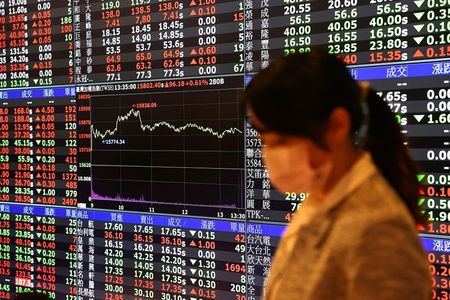This post was originally published on this site

Focus remained squarely on upcoming U.S. consumer price index inflation data due later in the day, which is in turn expected to factor into the Fed’s decision on Wednesday.
Technology stocks were the best performers for the day, rising on the prospect of a Fed pause and as reports suggested that U.S. chip sanctions on China will not affect Asian chipmakers as badly as initially feared.
The Taiwan Weighted index rose 1.6%, while South Korea’s KOSPI added 0.6%.
Chipmakers TSMC (TW:2330), Samsung Electronics Co Ltd (KS:005930) and SK Hynix Inc (KS:000660) jumped between 1.4% and 4% after a Wall Street Journal report said that the U.S. will let the three keep and expand their chipmaking infrastructure in China despite broader restrictions on chip exports to the country.
The move points to fewer disruptions for the chipmaking majors from the sanctions, and primes them for expansion as growing interest in artificial intelligence pushes up global chip demand.
Other chip-exposed stocks also rose, with Japanese semiconductor testing equipment maker Advantest Corp. (TYO:6857) up over 4%.
Japanese indexes continued to outpace their regional peers, with the Nikkei 225 up 2% while the broader TOPIX added 1.2%. Both indexes clocked fresh 33-year highs, and were supported chiefly by high-value technology stocks, which tracked their U.S. peers.
Technology investment house SoftBank Group Corp. (TYO:9984) jumped over 5% after a Reuters report said that chipmaker Intel (NASDAQ:INTC) was in talks to be an anchor investor in the initial public offering of Softbank’s chip designing unit, Arm.
Broader Japanese stocks also surged, buoyed by a strong first quarter earnings season and as traders bet on a dovish outlook from the Bank of Japan during a meeting this Friday.
Chinese markets continued to lag their peers, with an interest rate cut by the People’s Bank of China- its first in 10 months- spurring little gains in local markets.
China’s Shanghai Shenzhen CSI 300 and Shanghai Composite indexes moved in a flat-to-low range, while Hong Kong’s Hang Seng added 0.5%.
Concerns over a slowing Chinese economic rebound have largely unwound any major gains in local stocks, and kept them trading negative for the year.
Weakness in China also spilled over into Australia’s ASX 200, which barely rose after a long weekend.


